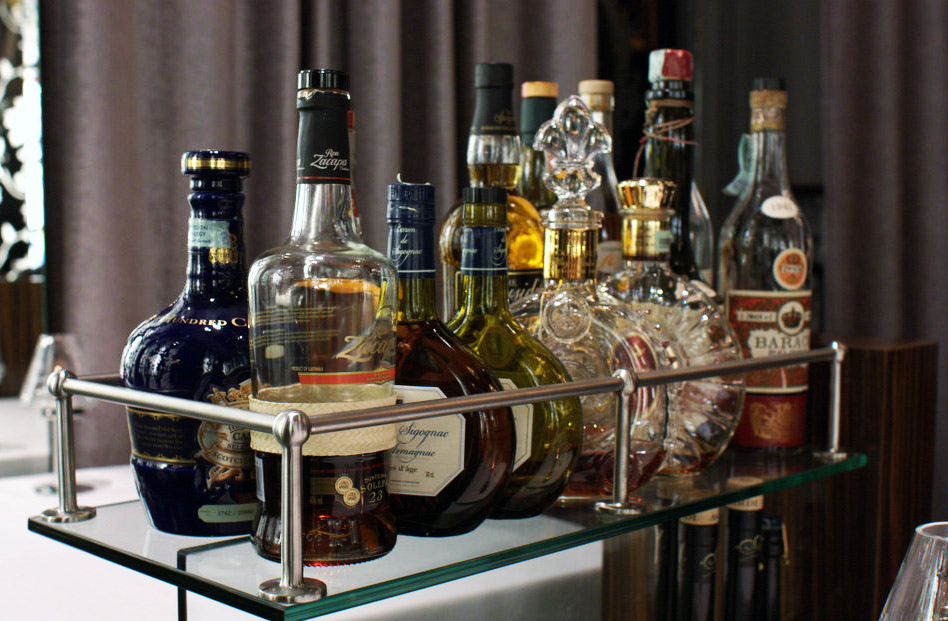 Remember back in college when everyone kept their vodka in the freezer? That was more about being able to do ice-cold shots at a moment’s notice than it was about proper storage. In fact, most liquors can and should be kept at room temperature — save for a few exceptions. If you’re not on top of proper storing techniques, the following tips will help you avoid any unwanted surprises. Hard Liquor In general, hard liquors should be stored out of direct sunlight and at room temperature. Prolonged exposure to UV rays can damage the contents of your bottle, which you definitely don’t want happening to that 20-year-old scotch. Contrary to popular belief, potent liquors don’t last forever once they’ve been opened. According to Ethan Kelley, Head Spirit Sommelier at the Brandy Library in NYC, alcohol begins to evaporate and a spirit will “lose its ‘sparkle’ and develop a flat taste.” He suggests polishing off a spirit within eight months of opening. Liqueurs Most liqueurs like Grand Marnier, Campari, Chambord, and St. Germaine can be stored at room temperature and last for a very long time. (The more alcohol they contain, the longer their shelf life.) That said, cream-based liqueurs like Bailey’s should be kept in the refrigerator and consumed within a year of purchase. Beer and Wine Beer and wine are easily affected by heat and light, and should be kept in a cool, dark place. Beer can be stored for roughly a few months, while wine tends to be best within a year to a year-and-a-half of purchase. Once opened, a wine’s shelf life varies depending on age and varietal, but a good rule of thumb is to consume within three days. (Or within three hours, if you’re more our speed.) Fortified Wine Like regular wine, fortified wines (think Port, Sherry, and yes, even Vermouth) will eventually oxidize and need to be kept in the fridge once they’ve been uncorked. While these don’t have nearly as short of a shelf life as your standard Cabernet, they will start to deteriorate after a few months (maybe six at the most). Our suggestion: Buy smaller 375mL bottles when available. Pro tip: Set up your home bar with a Vacu Vin bottle stopper to help prolong the life of your wines. For a mere 12 bucks, you’ll avoid having to pour half that bottle of Sherry down the sink. And few things are worse than that. Photo credit: Some rights reserved by scaredykat
Remember back in college when everyone kept their vodka in the freezer? That was more about being able to do ice-cold shots at a moment’s notice than it was about proper storage. In fact, most liquors can and should be kept at room temperature — save for a few exceptions. If you’re not on top of proper storing techniques, the following tips will help you avoid any unwanted surprises. Hard Liquor In general, hard liquors should be stored out of direct sunlight and at room temperature. Prolonged exposure to UV rays can damage the contents of your bottle, which you definitely don’t want happening to that 20-year-old scotch. Contrary to popular belief, potent liquors don’t last forever once they’ve been opened. According to Ethan Kelley, Head Spirit Sommelier at the Brandy Library in NYC, alcohol begins to evaporate and a spirit will “lose its ‘sparkle’ and develop a flat taste.” He suggests polishing off a spirit within eight months of opening. Liqueurs Most liqueurs like Grand Marnier, Campari, Chambord, and St. Germaine can be stored at room temperature and last for a very long time. (The more alcohol they contain, the longer their shelf life.) That said, cream-based liqueurs like Bailey’s should be kept in the refrigerator and consumed within a year of purchase. Beer and Wine Beer and wine are easily affected by heat and light, and should be kept in a cool, dark place. Beer can be stored for roughly a few months, while wine tends to be best within a year to a year-and-a-half of purchase. Once opened, a wine’s shelf life varies depending on age and varietal, but a good rule of thumb is to consume within three days. (Or within three hours, if you’re more our speed.) Fortified Wine Like regular wine, fortified wines (think Port, Sherry, and yes, even Vermouth) will eventually oxidize and need to be kept in the fridge once they’ve been uncorked. While these don’t have nearly as short of a shelf life as your standard Cabernet, they will start to deteriorate after a few months (maybe six at the most). Our suggestion: Buy smaller 375mL bottles when available. Pro tip: Set up your home bar with a Vacu Vin bottle stopper to help prolong the life of your wines. For a mere 12 bucks, you’ll avoid having to pour half that bottle of Sherry down the sink. And few things are worse than that. Photo credit: Some rights reserved by scaredykat
Last modified on 2015-06-08